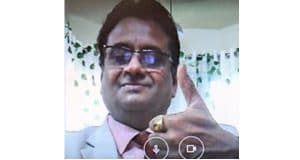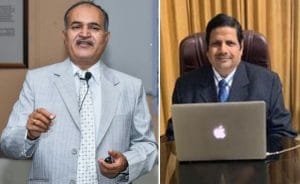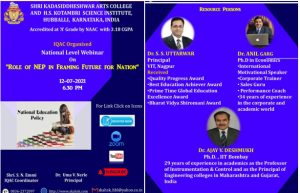K.L.E. Society’s S. K. Arts College and H. S. K Science Institute, Hubballi, Karnataka, India.
IQAC organized a National level Panel Discussion on *“Role of NEP in Framing Future for Nation”*.

Dr. Sanjay S Uttarwar a Renowned Motivational Speaker , Academician and and Principal of VIT Engineering College from Nagpur , Dr. Ajay Deshmukh Director of Bhaskaracharya Pratisthan Pune and Dr Anil Garg a International fame speaker was panelist for said panel discussion. It was Live on Zoom platform. Shri S N Emmi IQAC Coordinator introduce all panelist to the audience. Dr Uma V Nerle Principal of College welcome all panelist and online participants for program. Dr . Siddesh M. B* IQAC Co-Coordinator *Dr. Archana M* IQAC Member and other staff has taken painstaking efforts for success of panel discussion.
Majority of viewers around the globe was on line for the webinar. Dr Uma V Nerle welcome all the participants and resource persons in her address. Other prominent speakers who has expressed their views was Dr Ajay Deshmukh and Dr Anil Garg . Panel Discussion starts with the present condition of Academic scenario and picture expected in NEP 2020. Dr. Uttarwar nicely explain the importance of subject. He share present status of academics and gave brief idea about societies and Govts expectations from teacher as a whole.
Dr Uttarwar explained Aim, Principles , Structure of NEP to the online participants of webinar. He is a renowned Academician of central India and in this field since last thirty two years. He has proved his expertise by serving renowned educational groups of Maharashtra and MP. He has done Post graduation and PhD from Visvesvaraya National Institute of Technology Nagpur in Mechanical Engineering. He has done MBA in HR and MKTNG from RTMNU Nagpur He is recipient of seven National and International Level Awards for his outstanding contribution to the field of academics and research. He has visited UK, Singapore, China to present research papers in International Conferences. He is having sixty three research papers to his credit which are published in International Journals and Conferences.
In his delivery Dr. Uttarwar elaborate the importance of Implementation of NEP for better future of India. He says that teacher has to play key role in Nation Building, in NEP2020. Teachers should work to improve logical thinking ability of child in his early age of three to six years which is a crucial phase. Dr. Uttarwar further says that, 85 % of child’s brain develops in this age group, which should be framed cautiously. That’s why he says that role of Primary and secondary teacher is of utmost importance.
Dr Ajay Deshmukh .has explained the following points in detail to gathering. These are How teaching learning and assessment shall be in future if it is work from home mode of working? How industry will adjust with this type of situation? How the roles of faculty members would change in the modern and new education system? Why industry oriented courses are on a priority and what should be done for development faculty members on these lines? How the new NEP and industry would go together? What kind of training is required for faculty development in the new NEP.
Dr Anil Garg has explained the following points in detail to the audience. In New Education policy focus will be on 360-degree approach. , Are there any changes in Health sector in New Education Policy? , Can you please through light on Academic Credit bank (ACB)? , . How this new NEP will be helpful to the students become employable? , By When the new NEP will come in force? , Will there be any changes due to change in Ministry? While explaining the Role, Responsibilities and Opportunities for teacher , all panellist says that National Education Policy 2020 , has totally changed the role of teacher. Teacher should not confine him to his field only. He should possesses the all round knowledge to fulfill demand of hour. So the role of teacher in coming days is very crucial to frame the future of India. He further elaborate about ancient education system of our country. The rich heritage of ancient and eternal Indian knowledge and thought has been a guiding light for this Policy.
The pursuit of knowledge (Jnan), wisdom (Pragyaa), and truth (Satya) was always considered in Indian thought and philosophy as the highest human goal. The aim of education in ancient India was not just the acquisition of knowledge as preparation for life in this world, or life beyond schooling, but for the complete realization and liberation of the self. World-class institutions of ancient India such as Takshashila, Nalanda,Vikramshila, Vallabhi, set the highest standards of multidisciplinary teaching and research and hosted scholars and students from across backgrounds and countries. The Indian education system produced great scholars such as Charaka, Susruta, Aryabhata, Varahamihira, Bhaskaracharya, Brahmagupta, Chanakya, Chakrapani Datta, Madhava, Panini, Patanjali, Nagarjuna, Gautama, Pingala, Sankardev, Maitreyi, Gargi and Thiruvalluvar, among numerous others, who made seminal contributions to world knowledge in diverse fields such as mathematics, astronomy, metallurgy, medical science and surgery, civil engineering, architecture, shipbuilding and navigation, yoga, fine arts, chess, and more. Indian culture and philosophy have had a strong influence on the world. These rich legacies to world heritage must not only be nurtured and preserved for posterity but also researched, enhanced, and put to new uses through our education system.
The new education policy must provide to all students, irrespective of their place of residence, a quality education system, with particular focus on historically marginalized, disadvantaged, and underrepresented groups. Education is a great leveler and is the best tool for achieving economic and social mobility, inclusion, and equality. Initiatives must be in place to ensure that all students from such groups, despite inherent obstacles, are provided various targeted opportunities to enter and excel in the educational system. Govt is also planning to give all sort of training to teachers. Further Dr. S S Uttarwar explain structure of NEP and the role of NEP for better future of India. He says that In NEP 2020, school education structure is modified with Pedogogical and Curricular restructuring of 5+3+3+4 covering the ages 3-18 years. There are four stages . first is foundational stage which is from age 3 to 6 for anganwadi or pre school. Age 6-8 , two years is for class 1 and 2. Second stage is preparatory stage in the age 8-11 ie three years for class 3 to 5. Third stage is middls stage at age 11 to 14, ie 3 years for class 6 to 8. And forth stage is secondary at the age 14-18 ie four years for class 9 to 12. In current system age group 3 to 6 is not covered in 10+2 structure.as class 1 begins at age 6. In 5+3+3+4 structure a strong base of early chieldhood care and education from age 3 is included which will promote better learning’s. Dr. Uttarwar further says that, 85 % of child’s brain develops in this age group, which should be framed Anchor has nicely navigate the show and express views effectively during webinar and has also given heed to various points of NEP . Host gives concluding remarks Speaker extend his thanks to organizers for excellent and smart work of live broadcasting of webinar on Google meet and thanked Organizing team for inviting him for the webinar. Shri S N Emmi IQAC Coordinator . Dr Uma V Nerle Principal of College . Dr . Siddesh M. B* IQAC Co-Coordinator *Dr. Archana M* IQAC Member Host express his gratitude towards speakers and all on line viewers and propose Vote of Thanks.


















